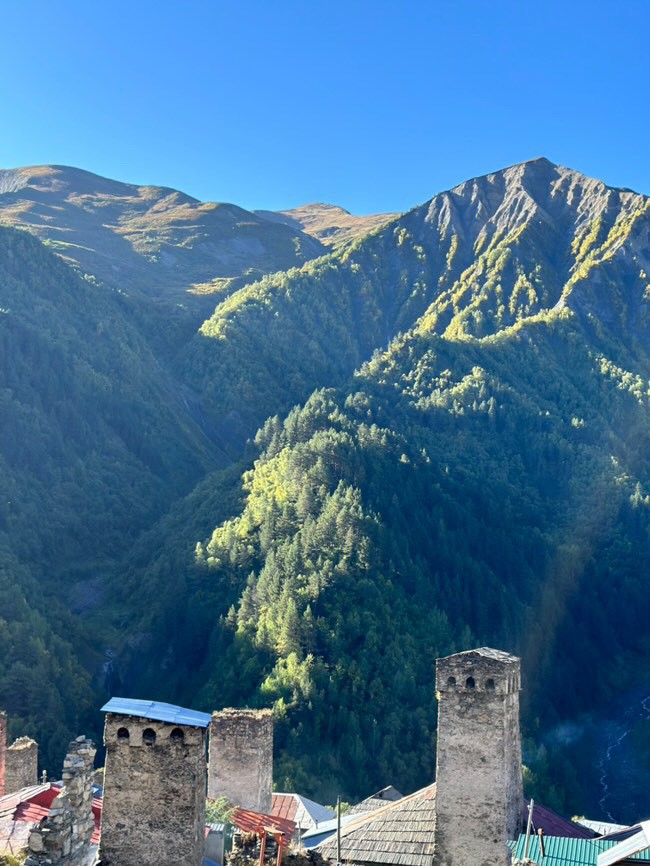Highlight 4/2025: The EU’s global gateway strategy with Georgia’s natural global gateway
Anuka Bakuradze, 3 January 2025

« Global Gateway » is a European strategy that aims to promote sustainable development by improving transport and energy infrastructure, strengthening health and education systems and fostering digital progress globally. The groundbreaking strategy is in full compliance with the UN 2030 agenda and its goals for sustainable development, as well as the Paris Agreement on climate change and it aims to mobilize investments for the ‘Team Europe’ approach of up to 300 billion euros worldwide. By September 2024, the EU attracted 2.1 billion euros in the form of state and private investments for Georgia.
Georgia is a natural gateway, a crossroad between Europe and Asia, a bridge where European geopolitical strategy embraces natural connectivity. Black sea crucial supply route, which is the main flagship initiative of the « Global Gateway », leverages Georgia’s natural pathway to foster the country’s full potential for integration into the EU’s single market. Both Georgia, an official EU candidate country, and the EU have declared the transport connection through the Black Sea as a priority. Historically, Georgia’s Black Sea coast was used by different powers like the Greeks, Romans and Ottomans. Moreover, a Great Silk Road which connected China with the Mediterranean world crossed Georgian mainland. Nowadays, it has great trade potential to increase and strengthen direct transport links with the EU member states.
Recognizing the growing significance of broadening horizons and exploring new opportunities for the expansion of East-West trade, the One Belt One Road Middle Corridor through Georgia is becoming a viable alternative to existing routes connecting Europe and Asia. Georgia positions itself as pivotal Caucasian logistic trade hub bolstered by its portfolio of free-trade agreements with EU and China. In order to improve Georgia’s connectivity with the European mainland, facilitate its membership aspirations toward EU and promote Economic and Investment Plan under the Eastern Partnership region framework, the European Investment Bank (EIB) has invested more than €2 billion in Georgia’s East-West highway. Georgia will be crucial partner bringing clean electricity from Central Asia to Europe. As part of the European Union’s Global Gateway initiative under the Black Sea, a 3 GW high-voltage cable of 1,195 km (743 miles) will connect Georgia to Romania from the historical town of Anaklia with a world-class deep-sea port. Quoting European Commission president Ursula von der Leyen, the project “could transform the country into an electricity hub and integrate it in the EU internal electricity market.” Georgia’s transit potential with the highways and the Baku-Tbilisi-Kars railway, The South Caucasus Pipeline (SCP) gas pipeline and Baku–Tbilisi–Ceyhan oil pipeline ensure the safe transportation of hydrocarbons from Central Asia to Europe.
European Unions’ Global Gateway geopolitical aims are entirely comingled with Georgia’s historical aspiration of European Union membership and its geopolitical context in the region. Although Georgia faces security issues with occupied territories of Abkhazia and South Ossetia by Russia, Georgia’s commitment to democracy, rule of law and modernization is resolute. Georgia is a European nation, which has a natural global gateway, as it is located at the intersection of Eastern Europe and West Asia. As a bridge between the hemispheres Georgia aims to integrate into European Union’s family and contribute to European global gateway strategy.
Anuka Bakuradze, Highlight 4/2025: The EU’s global gateway strategy with Georgia’s natural global gateway, 3 January 2025, available at www.meig.ch
The views expressed in the MEIG Highlights are personal to the authors and neither reflect the positions of the MEIG Programme nor those of the University of Geneva.
